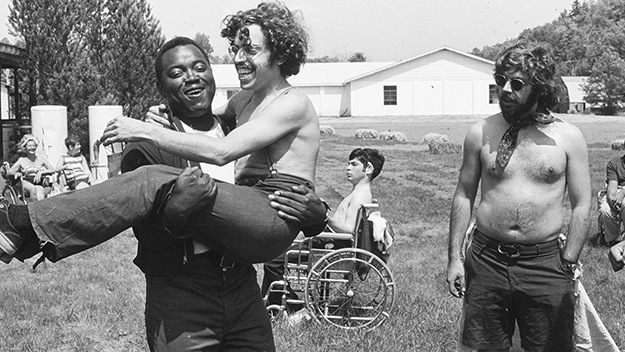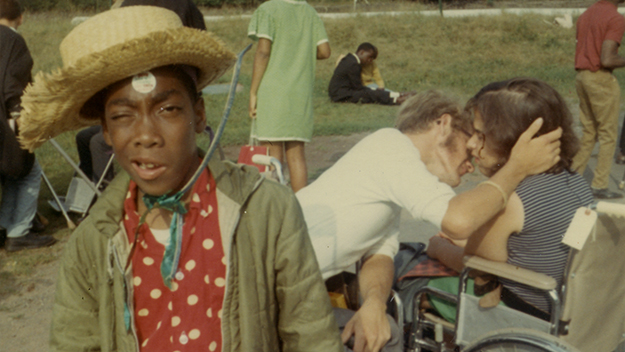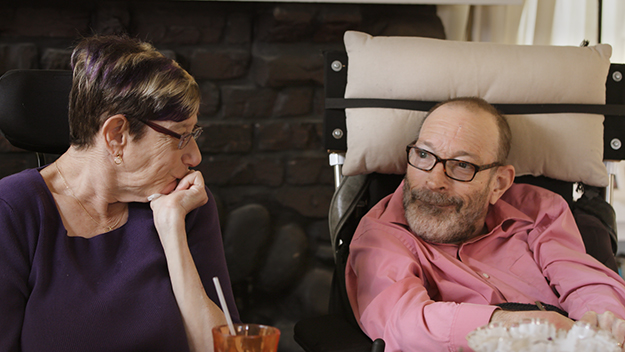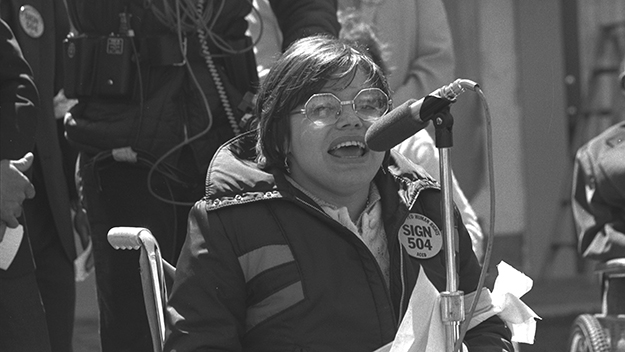Film of the Week: Crip Camp

All images from Crip Camp (Jim LeBrecht & Nicole Newnham, 2020)
Crip Camp is an eye-opener of a documentary, even if the title does sound like one that the National Lampoon series thought better of and junked. It’s very much a piece of personal testimony by one of its two writer-directors, Jim LeBrecht—the other is Nicole Newnham (The Revolutionary Optimists, Sentenced Home)—but it’s also an act of collective, generational testimony and a reminder of a more radical era motivated by hope and defiance. You pick up on that very quickly, even before you get to standard soundtrack choices like Ritchie Havens and Buffalo Springfield.
Subtitled “A Disability Revolution” (in the Netflix promotional material, but not in the film itself), Crip Camp is a buoyant, illuminating, and very to-the-point historical documentary, executive produced by Michelle and Barack Obama, under their Higher Ground Productions banner. It’s about Camp Jened, a Catskills summer camp for disabled teenagers which flourished in the ’60s and ’70s under enlightened policies very much informed by that era’s social explorations. But it’s also about what happened to the young people whose lives and consciousnesses were changed by it, and who subsequently managed to change the outside world, through phenomenal struggles. Seen both in archive footage as a 15-year-old at the camp, and today, LeBrecht—now an eminent film and theatre sound designer—remembers the revelation of attending Jened in 1971. Before that, he says, “ I wanted to be part of the world but I didn’t see anyone like me in it.” Suddenly he was surrounded by people like him, for most of whom Jened was every bit as strange a revelation as it was for him.
Jened’s director at the time was Larry Allison, an affable longhair with a dry fuck-you sense of humor, heard talking about creating “an environment where teenagers could be teenagers.” One camper talks about how counselors at other camps were more like babysitters, but at Jened—where many of the staff were themselves disabled—generated an atmosphere of joyous anarchy and egalitarian spirit. People stopped feeling like outsiders: LeBrecht, born with spina bifida, remembers the agony of wearing diapers at 15, “but at camp, everybody had something going on with their body.”

We see a dorm hut in glorious disorder, a bacchanalian dance party, kids in tie-dye T-shirts sitting around singing the Grateful Dead’s “Truckin’” and having candid group discussions about their lives and feelings (what used to be called “rap sessions” in the decades before the term changed its meaning). Solidarity, mutual recognition, and a sense of community burgeoned in a way many of these young people had never known before.
Lest this all sound solemn and pious, Jened was also a riotous hotbed of teenage lust. Jim met his first girlfriend Nanci d’Angelo there and remembers making out nonstop, while another interviewee remembers make-out sessions in every corner; it’s perhaps not surprising that at one point, there was a mass outbreak of crabs. Interviewee Neil Jacobson, who has cerebral palsy, remembers getting a primer in kissing from an older girl, a counselor—“one of the best physical therapies I ever had.” His wife, Denise Sherer Jacobson, whom he met at Jened and who also has cerebral palsy, equals him for gleeful ribaldry, and recalls a later experience, although a somewhat darker one: after having an affair with a bus driver, she was examined by a doctor who was amazed that she had gonorrhea, unable to imagine that she had had sex. After that, Denise says, “I decided to go back to school and get a Masters in Human Sexuality.”
It’s not surprising that after a summer at Jened, some campers felt that returning to their home lives was “like going back in time.” People talk about the place as heaven on earth (Denise: “It was a utopia. When we were there, there was no outside world”). Many of them compare the place to Woodstock, which was going on when some of them were at Jened. But if Jened was heaven, the corresponding hell was an establishment called Willowbrook, seen in some deeply harrowing footage from a contemporary TV exposé—“The Last Great Disgrace”—by Geraldo Rivera. Young disabled people are seen naked and emaciated, pablum stuffed into their mouths in lieu of proper feeding; there was so little care available there that residents got three minutes to eat at mealtime. When a Willowbrook person came to Jened, they ate with frantic hunger—“like somebody coming in from the wild,” remembers LeBrecht.

Denise and Neil Jacobson
Willowbrook, though an extreme, was closer to the realities of a world of prejudice and exclusion to which Jened offered an alternative. Mainstream TV reportage extracted from the period, even when drawing attention to the rights of the disabled, uses terms like “profoundly retarded,” or—describing a historic demonstration—“the occupation army of cripples has taken over.” People left Jened with a sense of pride and possibility, and profound anger at what the world continued to deny them. A key figure throughout, first seen as a 23-year-old counselor at Jened, is Judy Heumann, who tells her own story of growing up in East Flatbush. She remembers studying in an establishment which segregated, keeping disabled kids downstairs: “Even when we were that young, we knew we were being sidelined. We didn’t want to be sidelined any more.”
After its effusive celebration of salad days at Jened, Crip Camp shows how the young people who found liberation there took their fight to the outside world. There is still raucous stuff going on: in a section dealing with the Center for Independent Living, a Berkeley venture where disabled people organized themselves into a self-contained, self-run community, we see a clip of Jened alumnus Steve Hofmann doing a wild strip routine at the fabled LA punk club the Mabuhay Gardens. He dances to “Sweet Transvestite” from The Rocky Horror Show, with lyrics that sound tailor-made for disability pride: “Don’t get strung up by the way I look / Don’t judge a book by its cover.”
But most of the film’s post-Jened material is about hard times and struggle. Judy Heumann became a committed activist, president of Disabled in Action, and remembers a long fight that began in 1972 with the disappointment of the Rehabilitation Act, based on civil rights legislation of the ’60s. “It was like a yahoo wonderful moment,” she says, “and Nixon vetoed it.” Again and again, disability rights—under Nixon, Carter, Reagan—go to the wall because companies and public bodies alike don’t want to spend the necessary money required.

Judy Heumann
If Jened was its Woodstock, then the disability rights movement also had its Paris May ’68—the 1977 demonstration against then U.S. Health Secretary Joseph Califano, who had weakened and delayed new regulations. Protestors led by Heumann, many Jenedites among them, occupied the San Francisco offices of the Department of Health, Education, and Welfare, enduring significant hardships—no ventilators or catheters, quadriplegics sleeping on floors, some going on prolonged hunger strike. The FBI tried to cut them off from the outside by disconnecting the building’s phones; deaf occupiers maintained lines of communication by using sign language.
The strike lasted over three weeks, and succeeded in making Califano sign the required bill, enabling the all-important Section 504 of the Rehabilitation Act. The battle still had to be fought—as Denise Sherer Johnson says, “You can pass a law but until you change society’s attitudes, then that won’t mean much.” Crip Camp reminds you that most of us don’t know some of the dimensions of the word “struggle”: dimensions that become extraordinarily apparent when you see disabled protestors of all ages arduously heaving themselves on their arms and their bodies up a flight of stairs in a 1990 protest that was known as the “Capitol Crawl.”
The film ends with Jim LeBrecht and others returning to the former site of Jened, which folded in 1977 for financial reasons. The old rural oasis is gone, leveled to a drab plane of functional ground. “I almost want to get out of my wheelchair,” says Denise Sherer Jacobson, “and kiss the fucking dirt.” For her and LeBrecht, Jened is “hallowed ground”—all the more so because everything started for them with the euphorically unhallowed joys that their generation discovered there.
Jonathan Romney is a contributing editor to Film Comment and writes the Film of the Week column. He is a member of the London Film Critics Circle.







